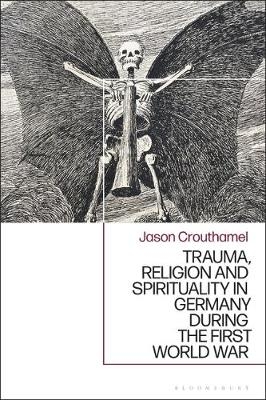
Trauma, Religion and Spirituality in Germany during the First World War
Bloomsbury Academic (Verlag)
978-1-350-08370-7 (ISBN)
Jason Crouthamel provides a fascinating exploration into the language and belief systems used by ordinary people to explain the inexplicable. From Judeo-Christian traditions to popular beliefs and ‘superstitions,’ German soldiers and civilians depended on a malleable psychological toolbox that included a hybrid of ideas stitched together using prewar concepts mixed with images or experiences derived from the surreal environment of modern combat. Perhaps most interestingly, studying the front experience exposes not only lived religion, but also how religious beliefs are invented. Front soldiers in particular constructed new, subjective spiritual and religious concepts based on encounters with industrialized weapons, the sacred experience of comradeship, and immersion in mass death, which profoundly altered their sense of self and the supernatural. More than just a coping mechanism, religious language and beliefs enabled victims, and perpetrators, of violence to narrate concepts of psychological renewal and rebirth. In the wake of defeat and revolution, religious concepts shaped by the war experience also became a cornerstone of visions for radical political movements, including the National Socialists, to transform a shattered and embittered German nation.
Making use of letters between soldiers and civilians, diaries, memoirs and front newspapers, Trauma, Religion and Spirituality in Germany during the First World War offers a unique glimpse into the belief systems of men and women at a turning point in European history.
Jason Crouthamel is Professor of History at Grand Valley State University, USA. He is the author of An Intimate History of the Front: Masculinity, Sexuality and Ordinary German Soldiers in the First World War (2014) and The Great War and German Memory: Society, Politics and Psychological Trauma (2009). He has also co-edited, along with Peter Leese, Psychological Trauma and the Legacy of the First World War (2016) and Traumatic Memories of the Second World War and After (2016). He recently co-edited, with Julia B. Köhne and Peter Leese, Languages of Trauma: History, Memory and Media (2021).
Acknowledgements
A Note on the Text
List of Abbreviations
Introduction
1. “Gott Mit Uns”: Hegemonic Religious Ideals, Emotions and Mobilizing for War
2. God and the ‘Spirit of 1914’: Religiosity of Ordinary Soldiers and Civilians at the Outbreak of the War
3. Processing Trauma: Nerves, Religious Language and Coping with Violence
4. “Where is God?” The Brutalization of Faith in the Front Experience
5. Diagnosing Religious Beliefs: Contemporary Scientific and Popular Debates over the Spiritual-Psychological Effects of the War
6. Alternative Beliefs in the Trenches: Superstitions, Gods and Monsters, and Religious Humor
7. Spiritual Subjectivities: Constructing New Beliefs Out of Total War
Epilogue: Defeat, Revolution and Aftermath
Conclusion
Bibliography
Index
| Erscheinungsdatum | 19.11.2021 |
|---|---|
| Zusatzinfo | 14 bw illus |
| Verlagsort | London |
| Sprache | englisch |
| Maße | 156 x 234 mm |
| Gewicht | 562 g |
| Themenwelt | Geschichte ► Allgemeine Geschichte ► Neuzeit (bis 1918) |
| Geschichte ► Teilgebiete der Geschichte ► Kulturgeschichte | |
| Geschichte ► Teilgebiete der Geschichte ► Religionsgeschichte | |
| ISBN-10 | 1-350-08370-4 / 1350083704 |
| ISBN-13 | 978-1-350-08370-7 / 9781350083707 |
| Zustand | Neuware |
| Informationen gemäß Produktsicherheitsverordnung (GPSR) | |
| Haben Sie eine Frage zum Produkt? |
aus dem Bereich


